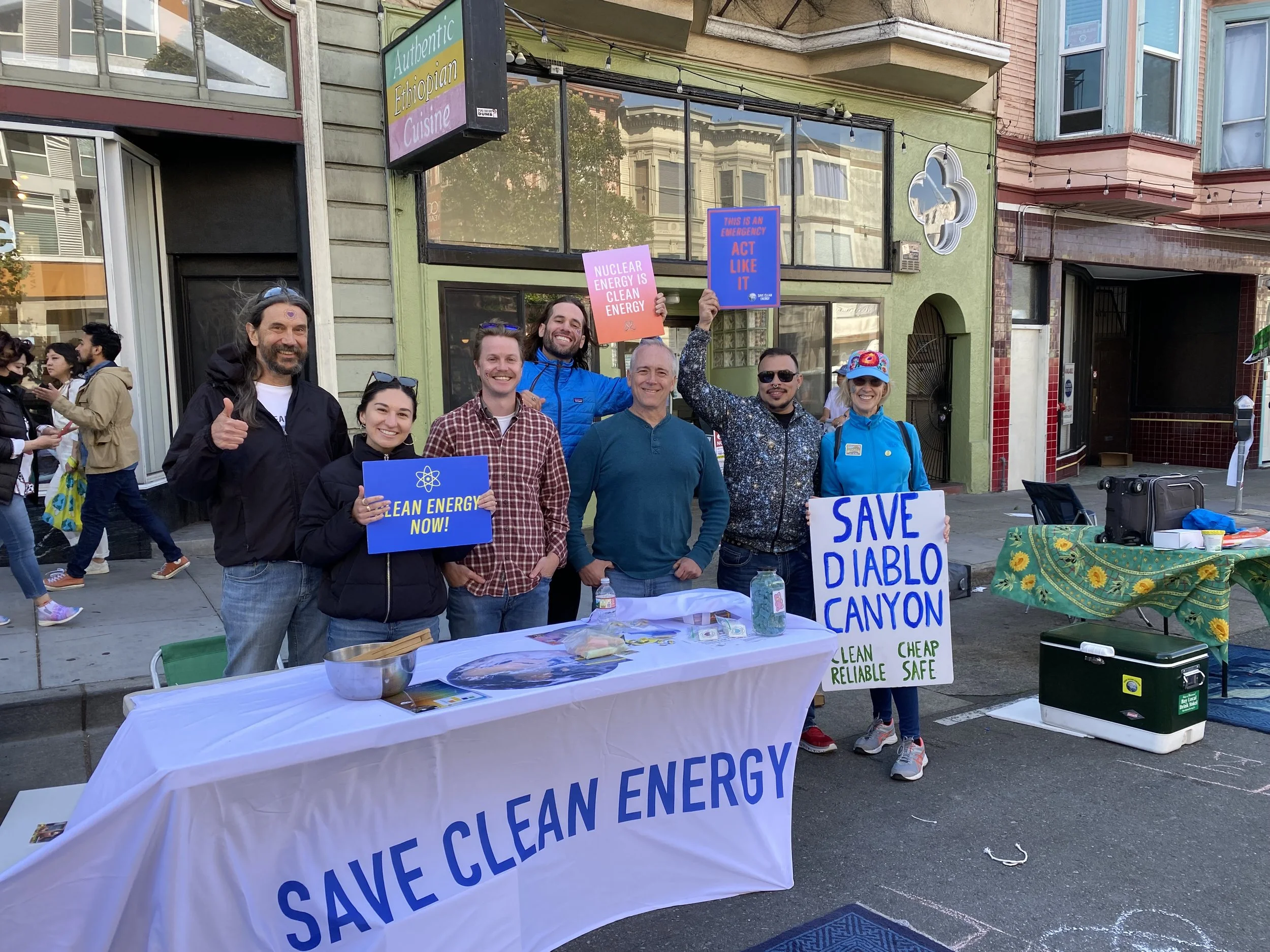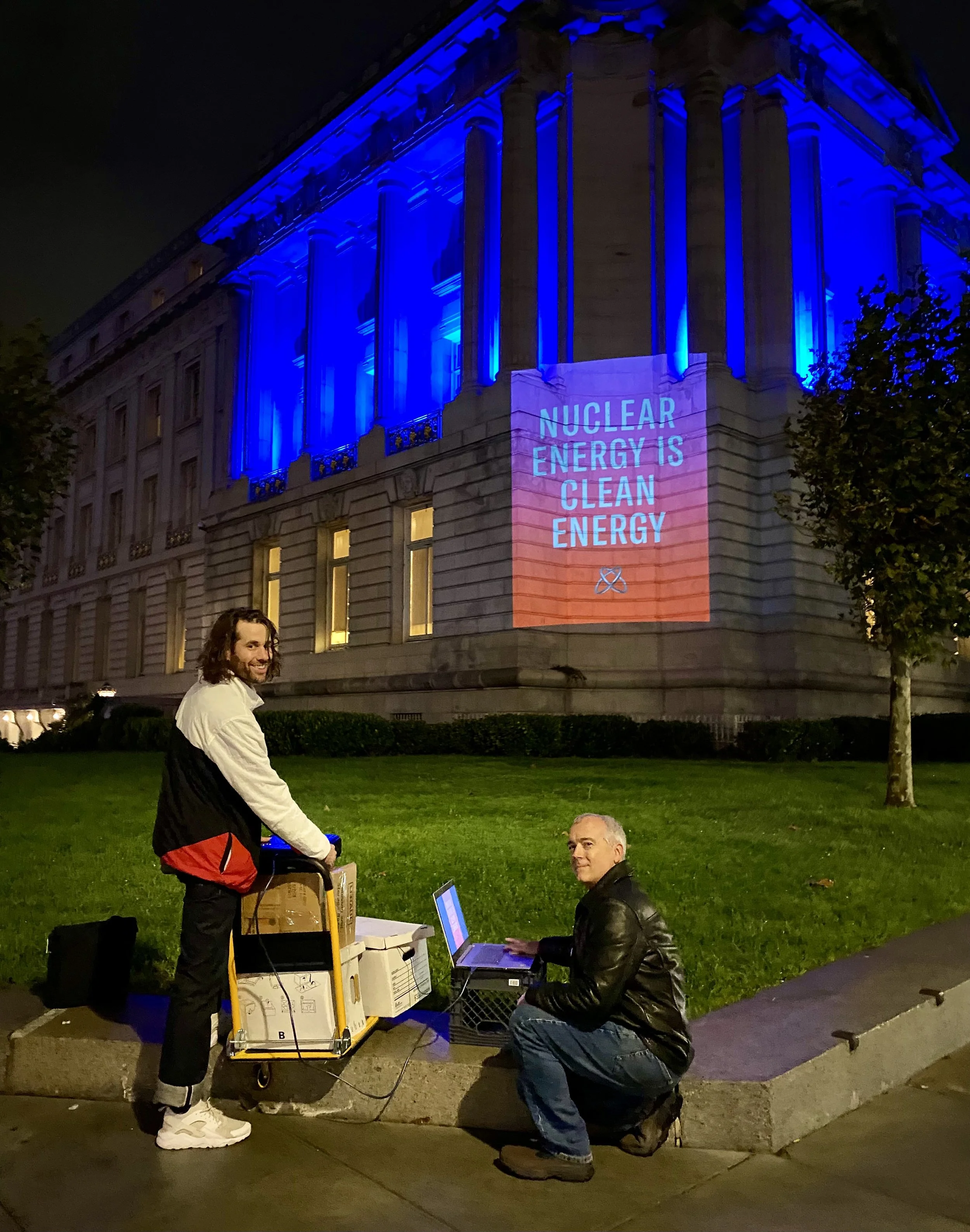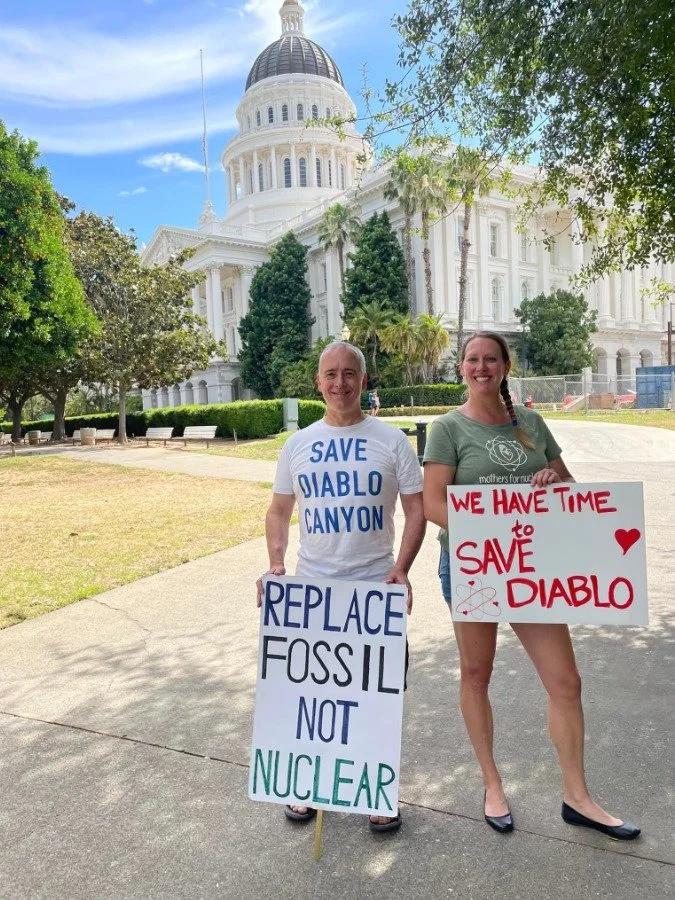Jim Hopf, Nuclear Waste Specialist, Nuclear Engineer, Californian Advocate, February ‘25
Meet the Nuclear News Curator and Waste Specialist
Jim Hopf entered into an early retirement to focus his entire efforts on nuclear advocacy. The Bay Area native from Chicago studied physics at MIT, earned a degree in nuclear engineering at the University of Texas, and worked in nuclear waste management for 25 years.
Hopf began his career at General Atomics in San Diego, a private defense and technology company that has worked on high-temperature gas-cooled reactors and dry cask storage innovations, on top of their work in aerospace. Hopf worked on transportation and storage containers for spent nuclear fuel. Over the years, Hopf performed shielding analysis, criticality analysis, and cast system design.
Hopf, with a “Replace Fossil Not Nuclear” sign, at a Save Diablo Canyon demonstration.
In the 2000s, Hopf became a prolific writer for the blog, ANS Nuclear Cafe, exploring double standards on nuclear, unjust public fears, and the need for new, tech-neutral policy. To expand his nuclear communication, Hopf started resharing essential nuclear energy news, starting in Facebook groups, before graduating to X (formerly Twitter), where he has become one of the leading sources of nuclear energy news.
From 2018 to 2023, Hopf played a key role in the Save Diablo Canyon campaign, writing op-eds, lobbying California legislators, and attending the Public UItility Commission, Nuclear Regulatory Commission, California Energy Commission, and Diablo Canyon Safety Commission hearings in support of nuclear. Hopf is also proud to have helped the effort (again writing op-eds) that led to the Illinois Energy Transition Act in 2021 that saved Byron, Dresden, and Braidwood from premature closure.
“If you played like a 1/1000 of the role of saving these four plants. And you said, how much the reduction in carbon from, running those plants for another 20 years would be. The math showed that the carbon you use over your entire life would be offset by 100 times,” Hopf said. “So far, these successes have been mainly in keeping existing plants open. So now we need nuclear deployed on a large scale, at a reasonable cost.”
Interested in science from a young age, Hopf initially wanted to go into fusion or advanced reactors, but no jobs were available, so he went into nuclear waste management - specializing in the transportation of spent fuel from commercial nuclear plants.
As an expert, Hopf said, there are no real, credible scenarios where nuclear storage poses a significant risk to the public outside the site. Undue fear of waste is one of the largest problems in the industry, according to Hopf.
“A lot of people say recycling technology (will) solve the problem,” Hopf said. “But it’s a technological solution to a false public perception problem. If you don’t handle the sociological side, they’re not going to accept that either.”
Instead of promoting recycling, Hopf likes to talk about the nuclear industry’s record on waste; over the past 60 years, nuclear waste has never harmed anyone. It is the only industry or energy source that not only contains all of its waste, instead of releasing it into the environment like many but proves with rigorous analysis that it will never be released into the environment. Hopf called it a standard of near perfection that no other industry has met and added funds have been already allocated for descendants if they need to manage the waste in any way.
Hopf believes that the nuclear industry’s style of communication on waste and safety is ineffective and counterproductive.
“They're very proud of these communicators that talk a lot about the unprecedented measures they're taking to keep you safe - to keep the public safe. Now, the problem with that message is that it directly implies that nuclear poses uniquely large hazards,” Hopf said. “It actually sends precisely the wrong message, and it makes people more fearful. The safety culture is out of control.”
Out of a belief in the utility of carbon pricing as a tech-neutral policy giving nuclear the same treatment as solar and wind, Hopf joined the Citizens Climate Lobby (CCL). CCL aims to get the nuclear industry behind carbon pricing and has seen moderate success; Exelon (now known as Constellation Energy) voiced support for carbon pricing in a public document, in 2020.
Hopf also created a nuclear action team with CCL, though it took some time and faced pushback from CCL leadership who were worried about offending certain members. The group informs CCL members on nuclear energy, often through slide presentations at CCL meetings, followed by Q&A sessions.
On top of his work with CCL, Hopf aims to serve as a nuclear news source on social media. Hopf utilizes nuclear news aggregator sites to select the most interesting and positive nuclear news stories to share on his X account. Several legislative staffers have reached out to Hopf to tell him, they learn a lot about nuclear through his feed.
“The fantasy is almost people may, to a significant extent, go to Jim Hopf’s Twitter feed to see what's going on in nuclear land,” Hopf said.
Moving forward with nuclear development around the world, Hopf sees a need for repositories, even with an ideal closed fuel cycle. Hopf noted that nuclear waste is already smaller than other waste streams by about a factor of 10,000, so recycling to make that waste 100,000 times smaller won’t make a significant impact.
“Repositories will help in people's minds, it'll help resolve the nuclear waste problem,” Hopf said. “I think that will have an impact on public perceptions and the politics.”
Hopf expects to see deep repositories across the world in the coming years. According to Hopf, efforts to site nuclear waste repositories in the U.S. have not failed because of local opposition, but rather state-level opposition. States feel they are being singled out as the nation’s “dumping ground” for nuclear waste.
Part of the value in Hopf’s advocacy, he says, is to help provide political cover to politicians by showing them that there is widespread support for nuclear energy and that the narrative is not dominated by anti-nuclear voices.
Hopf, left, and Heather Hoff, the founders of Mothers for Nuclear, at the California State Capitol to advocate for Diablo Canyon Nuclear plant.
Hopf said he advocates for nuclear because he believes in the need to fight climate change and fossil fuels.
“I want to maximize future nuclear deployment because it's become pretty clear that the way you increase overall public safety is to maximize deployment of nuclear because its orders of magnitude better than fossil fuels,” Hopf said.




